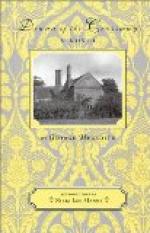How many have waved the adieu! And it is England nourishing, England protecting them, England clothing them in the honours they wear. Only the posturing lower natures, on the level of their buskins, can pluck out the pocket-knife of sentimental spite to cut themselves loose from her at heart in earnest. The higher, bleed as they may, too pressingly feel their debt. Diana had the Celtic vivid sense of country. In England she was Irish, by hereditary, and by wilful opposition. Abroad, gazing along the waters, observing, comparing, reflecting, above all, reading of the struggles at home, the things done and attempted, her soul of generosity made her, though not less Irish, a daughter of Britain. It is at a distance that striving countries should be seen if we would have them in the pure idea; and this young woman of fervid mind, a reader of public speeches and speculator on the tides of politics (desirous, further, to feel herself rather more in the pure idea), began to yearn for England long before her term of holiday exile had ended. She had been flattered by her friend, her ‘wedded martyr at the stake,’ as she named him, to believe that she could exercise a judgement in politics—could think, even speak acutely, on public affairs. The reports of speeches delivered by the men she knew or knew of, set her thrilling; and she fancied the sensibility to be as independent of her sympathy with the orators as her political notions were sovereignty above a sex devoted to trifles, and the feelings of a woman who had gone through fire. She fancied it confidently, notwithstanding a peculiar intuition that the plunge into the nobler business of the world would be a haven of safety for a woman with blood and imagination, when writing to Emma: ’Mr. Redworth’s great success in Parliament is good in itself, whatever his views of present questions; and I do not heed them when I look to what may be done by a man of such power in striking at unjust laws, which keep the really numerically better-half of the population in a state of slavery. If he had been a lawyer! It must be a lawyer’s initiative—a lawyer’s Bill. Mr. Percy Dacier also spoke well, as might have been expected, and his uncle’s compliment to him was merited. Should you meet him sound him. He has read for the Bar, and is younger than Mr. Redworth. The very young men and the old are our hope. The middleaged are hard and fast for existing facts. We pick our leaders on the slopes, the incline and decline of the mountain—not on the upper table-land midway, where all appears to men so solid, so tolerably smooth, save for a few excrescences, roughnesses, gradually to be levelled at their leisure; which induces one to protest that the middle-age of men is their time of delusion. It is no paradox. They may be publicly useful in a small way. I do not deny it at all. They must be near the gates of life—the opening or the closing—for their minds to be accessible to the urgency of the greater questions.




